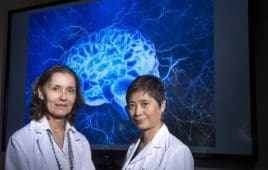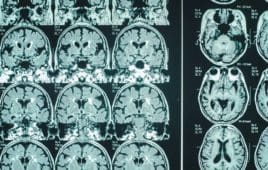Rutgers scientists have found a compound in coffee that may team up with caffeine to fight Parkinson’s disease and Lewy body dementia – two progressive and currently incurable diseases associated with brain degeneration. The discovery, recently published in the Proceedings of the National Academy of Sciences, suggests these two compounds combined may become a therapeutic option…
Researchers Advance Stem Cell Therapy with Biodegradable Scaffold
Rutgers scientists have created a tiny, biodegradable scaffold to transplant stem cells and deliver drugs, which may help treat Alzheimer’s and Parkinson’s diseases, aging brain degeneration, spinal cord injuries, and traumatic brain injuries. Stem cell transplantation, which shows promise as a treatment for central nervous system diseases, has been hampered by low cell survival rates,…
New Screening Tool Can Improve the Quality of Life for Epilepsy Patients With Sleep Apnea
Rutgers researchers have developed a tool to help neurologists screen for obstructive sleep apnea in people with epilepsy whose seizures can be magnified by sleep disorders. The study appears in the journal Neurology Clinical Practice. Although detection and treatment of obstructive sleep apnea (OSA) can improve seizure control in some patients with epilepsy, providers have not…
Possible Cause for Alzheimer’s and Traumatic Brain Injury
Traumatic Brain Injury: Discovery of Two Molecules Could Lead to New Drug Treatments
After 10 years of research, a Rutgers-led team of scientists has identified two molecules that protect nerve cells after a traumatic brain injury and could lead to new drug treatments. The molecules promote full recovery after traumatic brain injury (TBI) in mice, according to the study published online in Neurobiology of Disease. Traumatic brain injury is…
Epileptic Seizures and Depression May Share a Common Genetic Cause
From the time of Hippocrates, physicians have suspected a link between epilepsy and depression. Now, for the first time, scientists at Rutgers University-New Brunswick and Columbia University have found evidence that seizures and mood disorders such as depression may share the same genetic cause in some people with epilepsy, which may lead to better screening…
Researchers Determine Structure of Tuberculosis Drug Target
Rutgers University scientists have determined the three-dimensional structure of the target of the first-line anti-tuberculosis drug rifampin. They have also discovered a new class of potential anti-tuberculosis drugs that kill rifampin-resistant and multi-drug-resistant tuberculosis bacteria. Tuberculosis (TB) bacteria infect a third of the world’s population and the disease kills 1.8 million people annually. Rifampin, a…









